Impact of Culture, Motivation, and Power on Organisational Behaviour
VerifiedAdded on 2020/12/24
|16
|4855
|481
Report
AI Summary
This report provides a comprehensive analysis of organisational behaviour, focusing on the case of A David & Co. Limited, a food and beverage company. It explores the impact of culture, politics, and power on individual and team behaviour and performance, highlighting how these elements interact within the workplace. The report delves into various motivation theories, including process and content theories such as Vroom's Expectancy Theory, Adam's Equity Theory, Maslow's Hierarchy of Needs, and Herzberg's Two-Factor Theory, to understand how organisations can effectively motivate their employees to achieve objectives. Furthermore, the report examines the characteristics of effective versus ineffective teams, providing insights into team dynamics and performance. Finally, it applies concepts and philosophies of organisational behaviour to specific business situations, offering practical recommendations for A David & Co. Limited to improve its organisational practices and overall performance.
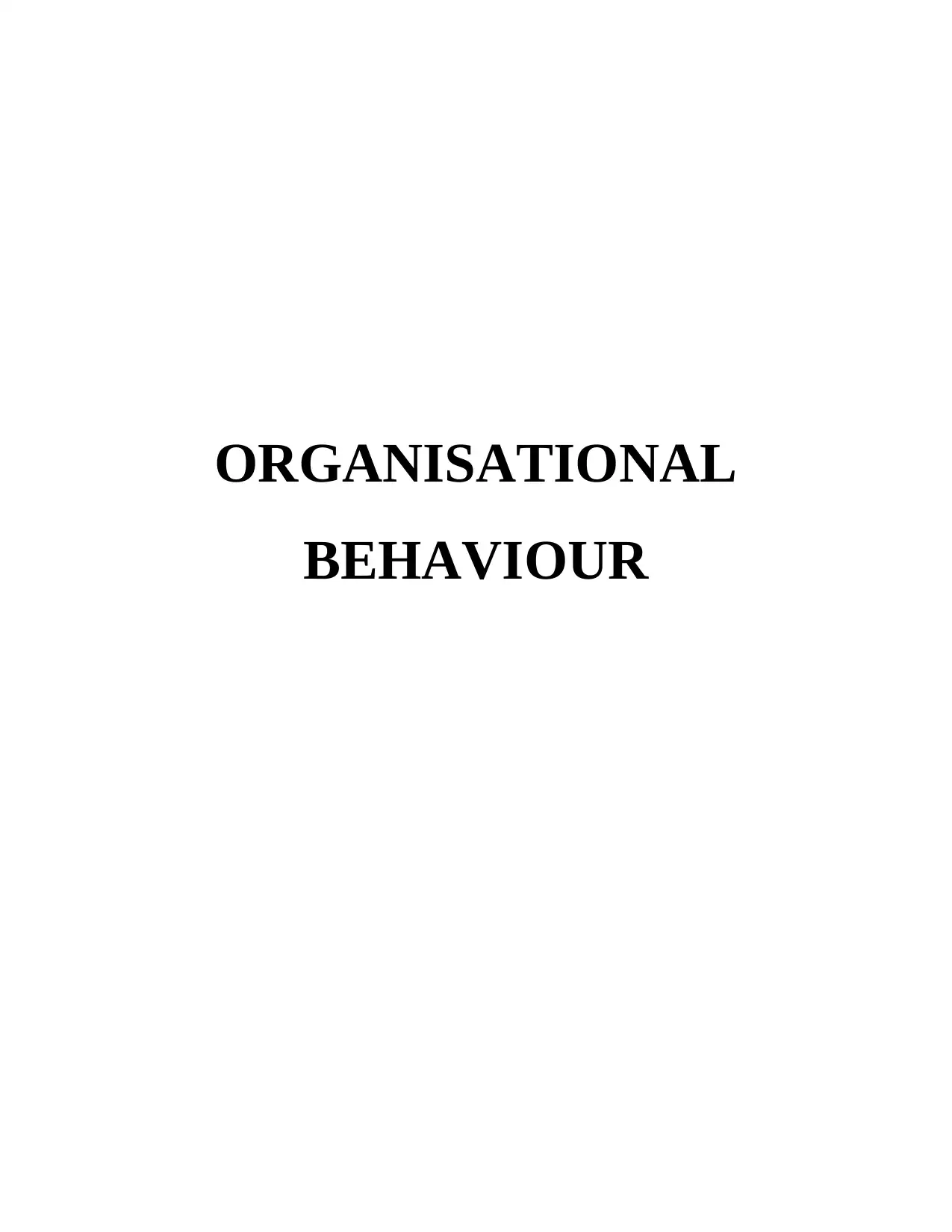
ORGANISATIONAL
BEHAVIOUR
BEHAVIOUR
Paraphrase This Document
Need a fresh take? Get an instant paraphrase of this document with our AI Paraphraser
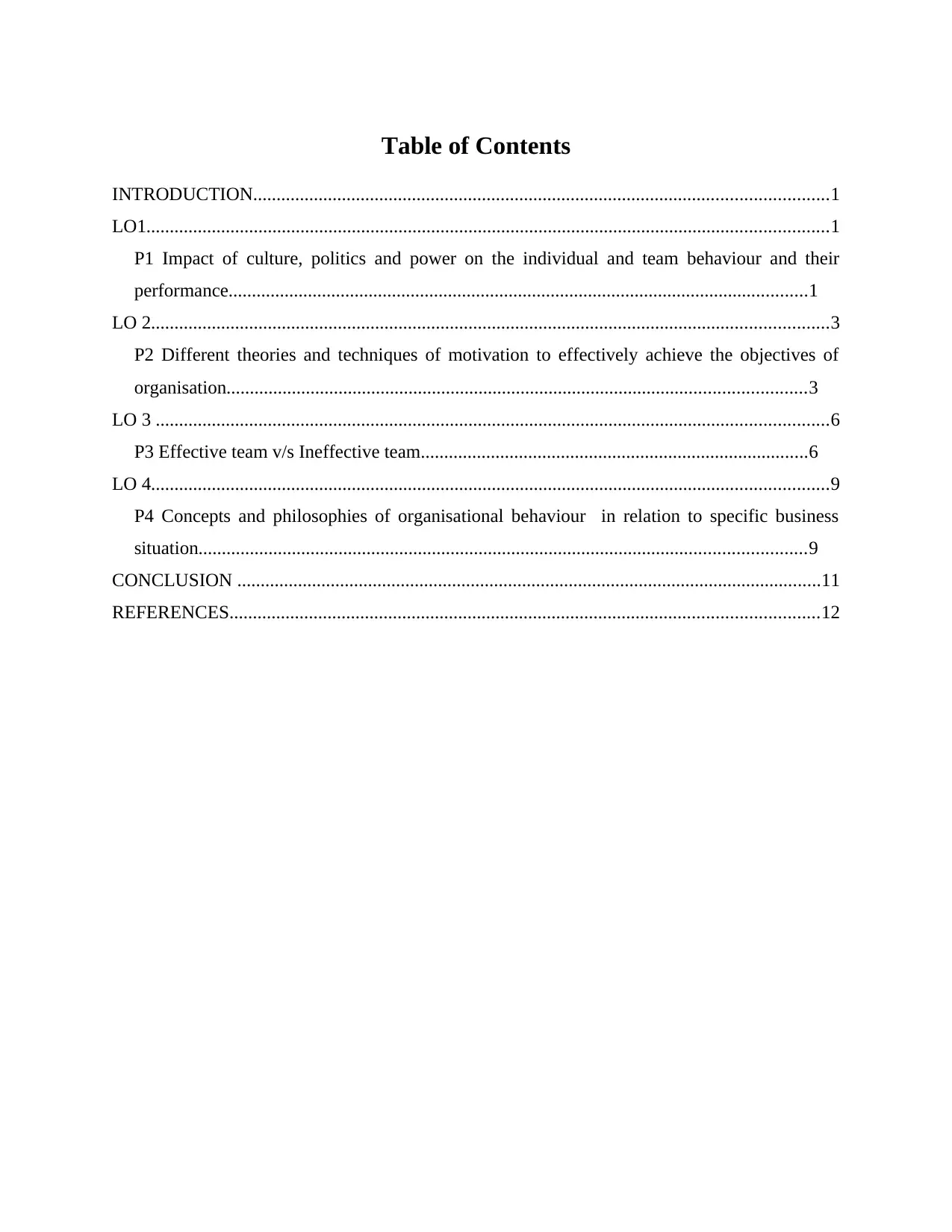
Table of Contents
INTRODUCTION...........................................................................................................................1
LO1..................................................................................................................................................1
P1 Impact of culture, politics and power on the individual and team behaviour and their
performance............................................................................................................................1
LO 2.................................................................................................................................................3
P2 Different theories and techniques of motivation to effectively achieve the objectives of
organisation............................................................................................................................3
LO 3 ................................................................................................................................................6
P3 Effective team v/s Ineffective team...................................................................................6
LO 4.................................................................................................................................................9
P4 Concepts and philosophies of organisational behaviour in relation to specific business
situation..................................................................................................................................9
CONCLUSION .............................................................................................................................11
REFERENCES..............................................................................................................................12
INTRODUCTION...........................................................................................................................1
LO1..................................................................................................................................................1
P1 Impact of culture, politics and power on the individual and team behaviour and their
performance............................................................................................................................1
LO 2.................................................................................................................................................3
P2 Different theories and techniques of motivation to effectively achieve the objectives of
organisation............................................................................................................................3
LO 3 ................................................................................................................................................6
P3 Effective team v/s Ineffective team...................................................................................6
LO 4.................................................................................................................................................9
P4 Concepts and philosophies of organisational behaviour in relation to specific business
situation..................................................................................................................................9
CONCLUSION .............................................................................................................................11
REFERENCES..............................................................................................................................12
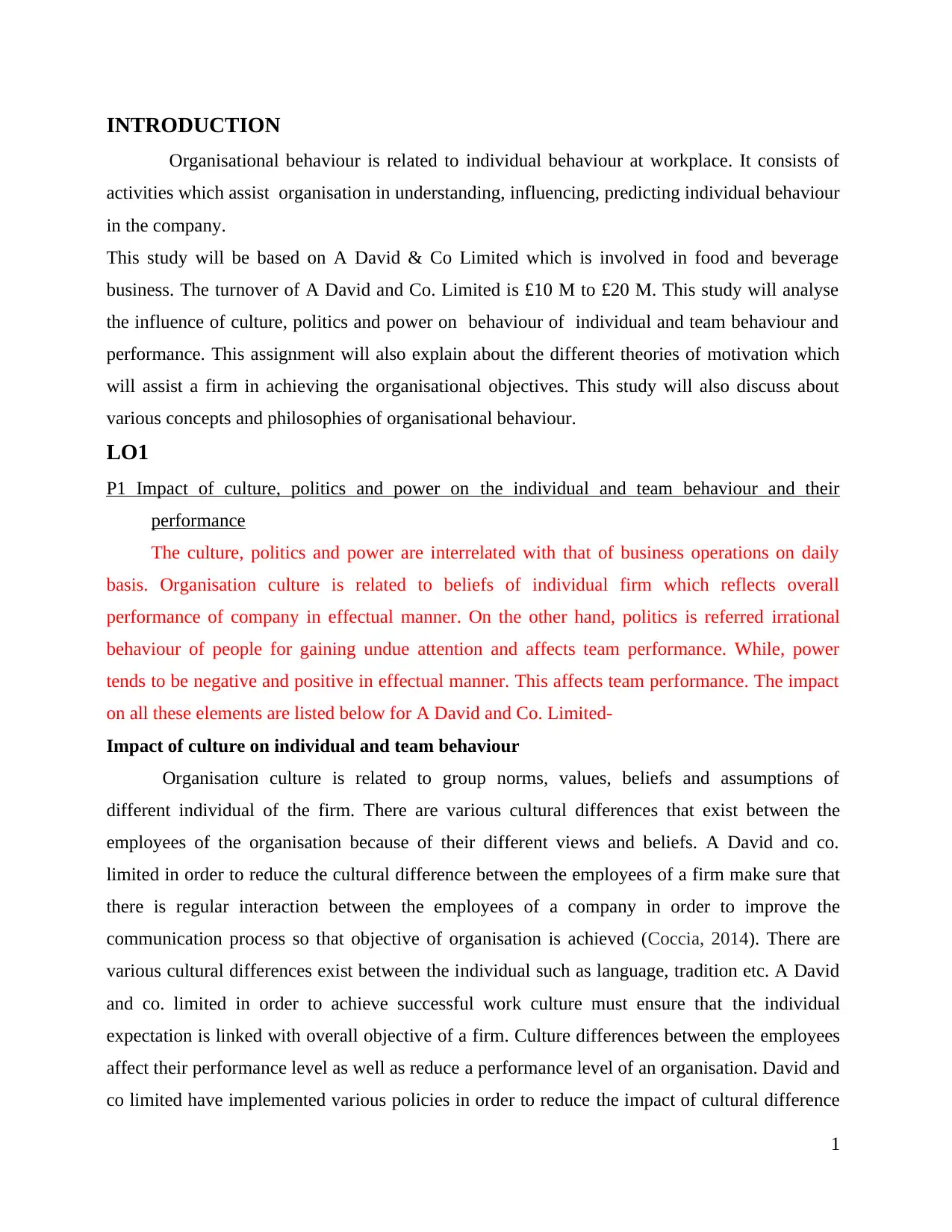
INTRODUCTION
Organisational behaviour is related to individual behaviour at workplace. It consists of
activities which assist organisation in understanding, influencing, predicting individual behaviour
in the company.
This study will be based on A David & Co Limited which is involved in food and beverage
business. The turnover of A David and Co. Limited is £10 M to £20 M. This study will analyse
the influence of culture, politics and power on behaviour of individual and team behaviour and
performance. This assignment will also explain about the different theories of motivation which
will assist a firm in achieving the organisational objectives. This study will also discuss about
various concepts and philosophies of organisational behaviour.
LO1
P1 Impact of culture, politics and power on the individual and team behaviour and their
performance
The culture, politics and power are interrelated with that of business operations on daily
basis. Organisation culture is related to beliefs of individual firm which reflects overall
performance of company in effectual manner. On the other hand, politics is referred irrational
behaviour of people for gaining undue attention and affects team performance. While, power
tends to be negative and positive in effectual manner. This affects team performance. The impact
on all these elements are listed below for A David and Co. Limited-
Impact of culture on individual and team behaviour
Organisation culture is related to group norms, values, beliefs and assumptions of
different individual of the firm. There are various cultural differences that exist between the
employees of the organisation because of their different views and beliefs. A David and co.
limited in order to reduce the cultural difference between the employees of a firm make sure that
there is regular interaction between the employees of a company in order to improve the
communication process so that objective of organisation is achieved (Coccia, 2014). There are
various cultural differences exist between the individual such as language, tradition etc. A David
and co. limited in order to achieve successful work culture must ensure that the individual
expectation is linked with overall objective of a firm. Culture differences between the employees
affect their performance level as well as reduce a performance level of an organisation. David and
co limited have implemented various policies in order to reduce the impact of cultural difference
1
Organisational behaviour is related to individual behaviour at workplace. It consists of
activities which assist organisation in understanding, influencing, predicting individual behaviour
in the company.
This study will be based on A David & Co Limited which is involved in food and beverage
business. The turnover of A David and Co. Limited is £10 M to £20 M. This study will analyse
the influence of culture, politics and power on behaviour of individual and team behaviour and
performance. This assignment will also explain about the different theories of motivation which
will assist a firm in achieving the organisational objectives. This study will also discuss about
various concepts and philosophies of organisational behaviour.
LO1
P1 Impact of culture, politics and power on the individual and team behaviour and their
performance
The culture, politics and power are interrelated with that of business operations on daily
basis. Organisation culture is related to beliefs of individual firm which reflects overall
performance of company in effectual manner. On the other hand, politics is referred irrational
behaviour of people for gaining undue attention and affects team performance. While, power
tends to be negative and positive in effectual manner. This affects team performance. The impact
on all these elements are listed below for A David and Co. Limited-
Impact of culture on individual and team behaviour
Organisation culture is related to group norms, values, beliefs and assumptions of
different individual of the firm. There are various cultural differences that exist between the
employees of the organisation because of their different views and beliefs. A David and co.
limited in order to reduce the cultural difference between the employees of a firm make sure that
there is regular interaction between the employees of a company in order to improve the
communication process so that objective of organisation is achieved (Coccia, 2014). There are
various cultural differences exist between the individual such as language, tradition etc. A David
and co. limited in order to achieve successful work culture must ensure that the individual
expectation is linked with overall objective of a firm. Culture differences between the employees
affect their performance level as well as reduce a performance level of an organisation. David and
co limited have implemented various policies in order to reduce the impact of cultural difference
1
⊘ This is a preview!⊘
Do you want full access?
Subscribe today to unlock all pages.

Trusted by 1+ million students worldwide
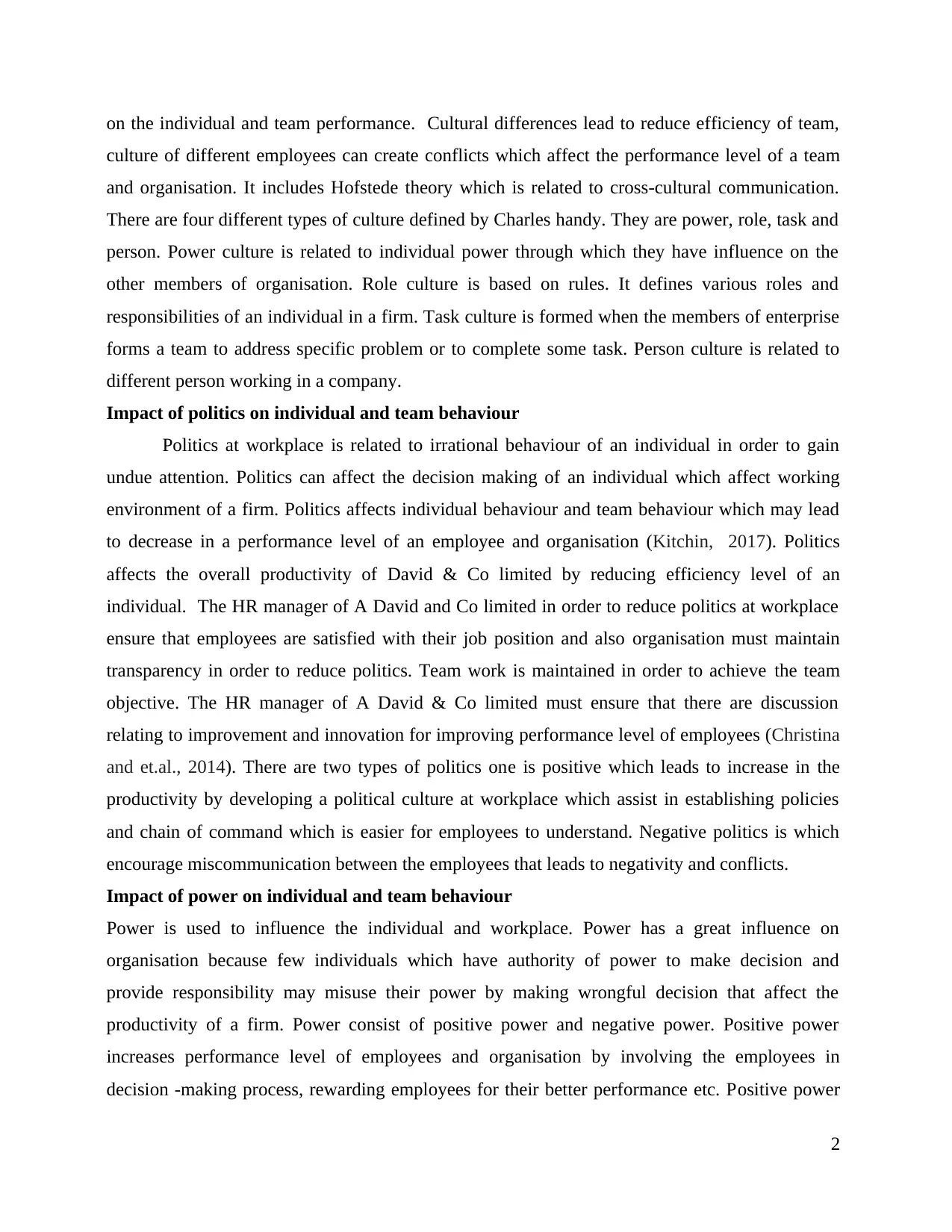
on the individual and team performance. Cultural differences lead to reduce efficiency of team,
culture of different employees can create conflicts which affect the performance level of a team
and organisation. It includes Hofstede theory which is related to cross-cultural communication.
There are four different types of culture defined by Charles handy. They are power, role, task and
person. Power culture is related to individual power through which they have influence on the
other members of organisation. Role culture is based on rules. It defines various roles and
responsibilities of an individual in a firm. Task culture is formed when the members of enterprise
forms a team to address specific problem or to complete some task. Person culture is related to
different person working in a company.
Impact of politics on individual and team behaviour
Politics at workplace is related to irrational behaviour of an individual in order to gain
undue attention. Politics can affect the decision making of an individual which affect working
environment of a firm. Politics affects individual behaviour and team behaviour which may lead
to decrease in a performance level of an employee and organisation (Kitchin, 2017). Politics
affects the overall productivity of David & Co limited by reducing efficiency level of an
individual. The HR manager of A David and Co limited in order to reduce politics at workplace
ensure that employees are satisfied with their job position and also organisation must maintain
transparency in order to reduce politics. Team work is maintained in order to achieve the team
objective. The HR manager of A David & Co limited must ensure that there are discussion
relating to improvement and innovation for improving performance level of employees (Christina
and et.al., 2014). There are two types of politics one is positive which leads to increase in the
productivity by developing a political culture at workplace which assist in establishing policies
and chain of command which is easier for employees to understand. Negative politics is which
encourage miscommunication between the employees that leads to negativity and conflicts.
Impact of power on individual and team behaviour
Power is used to influence the individual and workplace. Power has a great influence on
organisation because few individuals which have authority of power to make decision and
provide responsibility may misuse their power by making wrongful decision that affect the
productivity of a firm. Power consist of positive power and negative power. Positive power
increases performance level of employees and organisation by involving the employees in
decision -making process, rewarding employees for their better performance etc. Positive power
2
culture of different employees can create conflicts which affect the performance level of a team
and organisation. It includes Hofstede theory which is related to cross-cultural communication.
There are four different types of culture defined by Charles handy. They are power, role, task and
person. Power culture is related to individual power through which they have influence on the
other members of organisation. Role culture is based on rules. It defines various roles and
responsibilities of an individual in a firm. Task culture is formed when the members of enterprise
forms a team to address specific problem or to complete some task. Person culture is related to
different person working in a company.
Impact of politics on individual and team behaviour
Politics at workplace is related to irrational behaviour of an individual in order to gain
undue attention. Politics can affect the decision making of an individual which affect working
environment of a firm. Politics affects individual behaviour and team behaviour which may lead
to decrease in a performance level of an employee and organisation (Kitchin, 2017). Politics
affects the overall productivity of David & Co limited by reducing efficiency level of an
individual. The HR manager of A David and Co limited in order to reduce politics at workplace
ensure that employees are satisfied with their job position and also organisation must maintain
transparency in order to reduce politics. Team work is maintained in order to achieve the team
objective. The HR manager of A David & Co limited must ensure that there are discussion
relating to improvement and innovation for improving performance level of employees (Christina
and et.al., 2014). There are two types of politics one is positive which leads to increase in the
productivity by developing a political culture at workplace which assist in establishing policies
and chain of command which is easier for employees to understand. Negative politics is which
encourage miscommunication between the employees that leads to negativity and conflicts.
Impact of power on individual and team behaviour
Power is used to influence the individual and workplace. Power has a great influence on
organisation because few individuals which have authority of power to make decision and
provide responsibility may misuse their power by making wrongful decision that affect the
productivity of a firm. Power consist of positive power and negative power. Positive power
increases performance level of employees and organisation by involving the employees in
decision -making process, rewarding employees for their better performance etc. Positive power
2
Paraphrase This Document
Need a fresh take? Get an instant paraphrase of this document with our AI Paraphraser
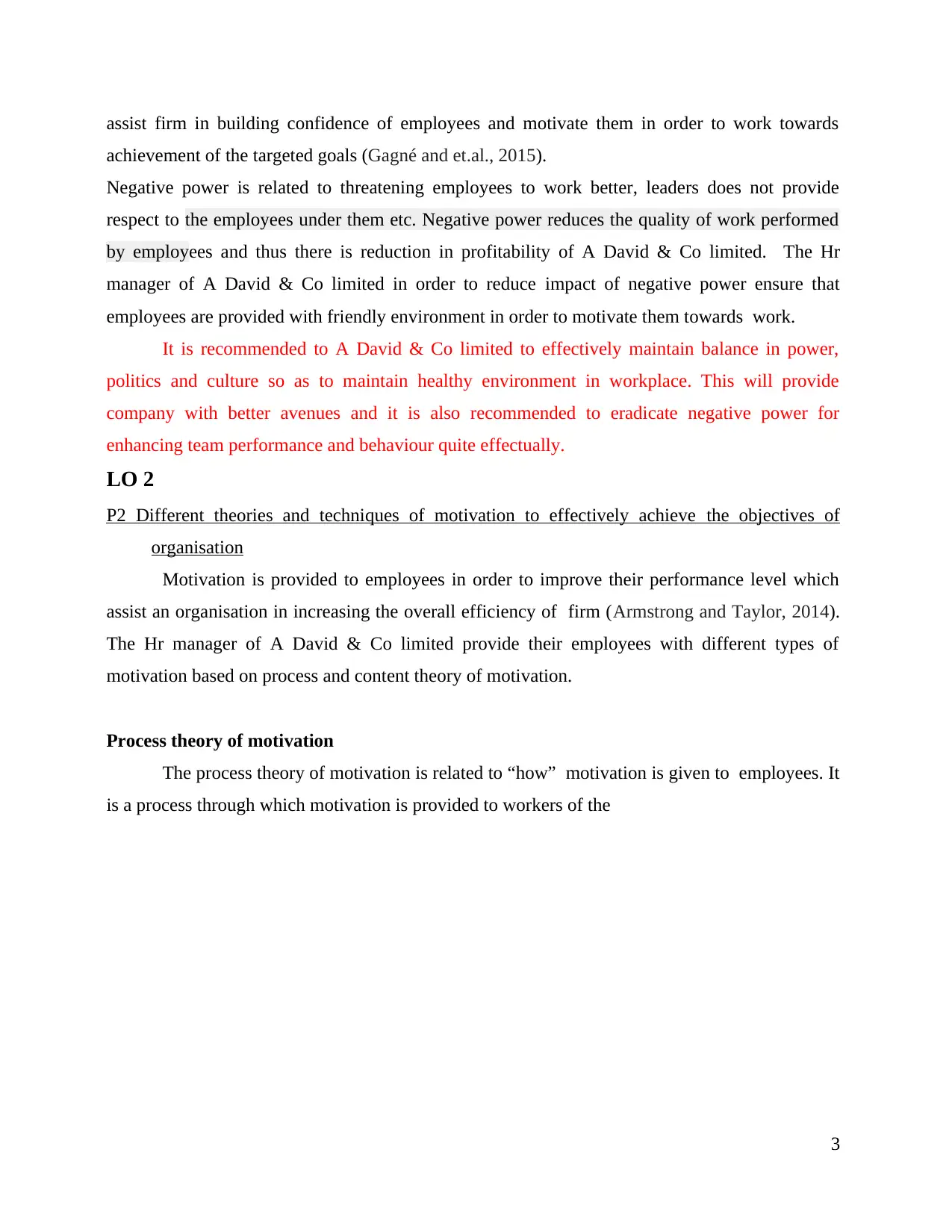
assist firm in building confidence of employees and motivate them in order to work towards
achievement of the targeted goals (Gagné and et.al., 2015).
Negative power is related to threatening employees to work better, leaders does not provide
respect to the employees under them etc. Negative power reduces the quality of work performed
by employees and thus there is reduction in profitability of A David & Co limited. The Hr
manager of A David & Co limited in order to reduce impact of negative power ensure that
employees are provided with friendly environment in order to motivate them towards work.
It is recommended to A David & Co limited to effectively maintain balance in power,
politics and culture so as to maintain healthy environment in workplace. This will provide
company with better avenues and it is also recommended to eradicate negative power for
enhancing team performance and behaviour quite effectually.
LO 2
P2 Different theories and techniques of motivation to effectively achieve the objectives of
organisation
Motivation is provided to employees in order to improve their performance level which
assist an organisation in increasing the overall efficiency of firm (Armstrong and Taylor, 2014).
The Hr manager of A David & Co limited provide their employees with different types of
motivation based on process and content theory of motivation.
Process theory of motivation
The process theory of motivation is related to “how” motivation is given to employees. It
is a process through which motivation is provided to workers of the
3
achievement of the targeted goals (Gagné and et.al., 2015).
Negative power is related to threatening employees to work better, leaders does not provide
respect to the employees under them etc. Negative power reduces the quality of work performed
by employees and thus there is reduction in profitability of A David & Co limited. The Hr
manager of A David & Co limited in order to reduce impact of negative power ensure that
employees are provided with friendly environment in order to motivate them towards work.
It is recommended to A David & Co limited to effectively maintain balance in power,
politics and culture so as to maintain healthy environment in workplace. This will provide
company with better avenues and it is also recommended to eradicate negative power for
enhancing team performance and behaviour quite effectually.
LO 2
P2 Different theories and techniques of motivation to effectively achieve the objectives of
organisation
Motivation is provided to employees in order to improve their performance level which
assist an organisation in increasing the overall efficiency of firm (Armstrong and Taylor, 2014).
The Hr manager of A David & Co limited provide their employees with different types of
motivation based on process and content theory of motivation.
Process theory of motivation
The process theory of motivation is related to “how” motivation is given to employees. It
is a process through which motivation is provided to workers of the
3
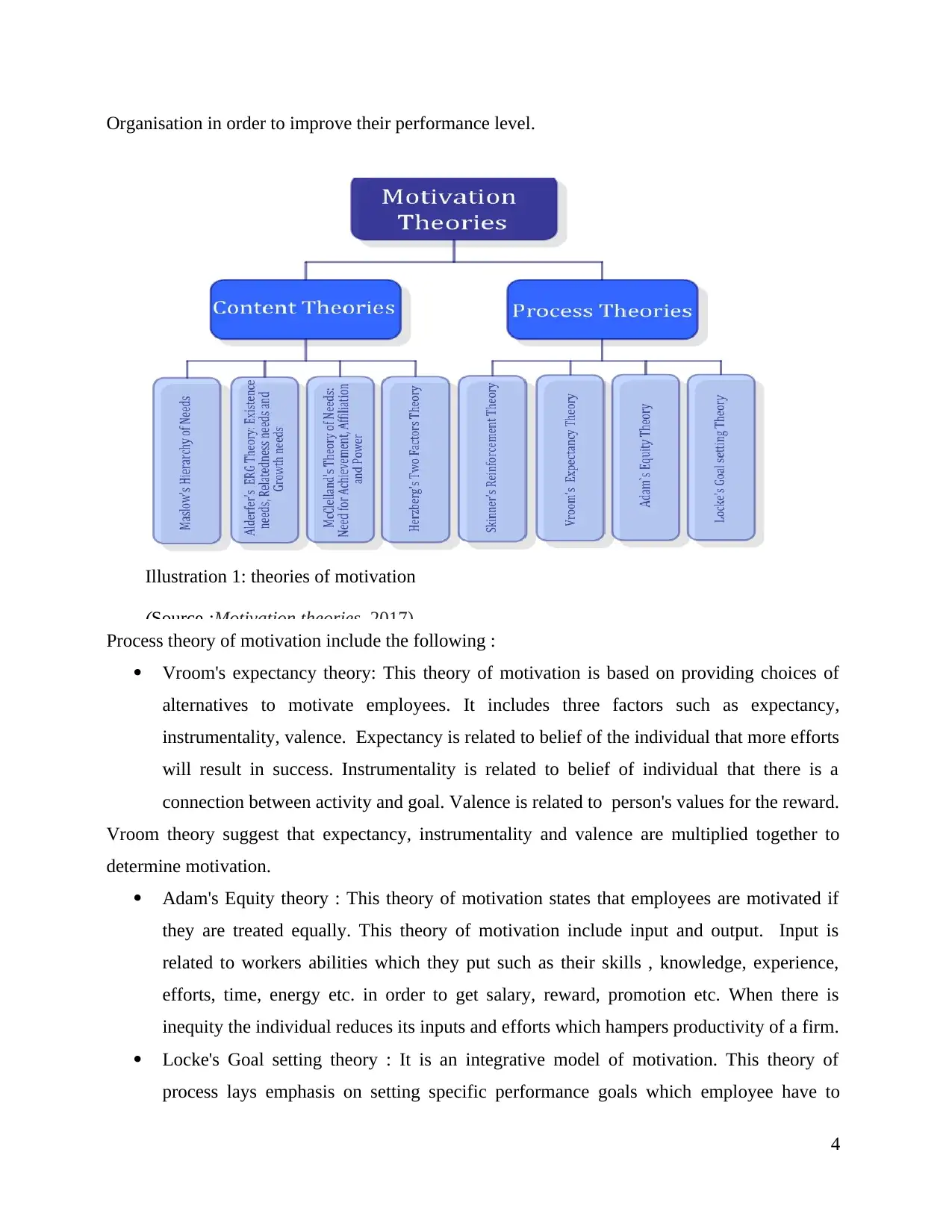
Organisation in order to improve their performance level.
Process theory of motivation include the following :
Vroom's expectancy theory: This theory of motivation is based on providing choices of
alternatives to motivate employees. It includes three factors such as expectancy,
instrumentality, valence. Expectancy is related to belief of the individual that more efforts
will result in success. Instrumentality is related to belief of individual that there is a
connection between activity and goal. Valence is related to person's values for the reward.
Vroom theory suggest that expectancy, instrumentality and valence are multiplied together to
determine motivation.
Adam's Equity theory : This theory of motivation states that employees are motivated if
they are treated equally. This theory of motivation include input and output. Input is
related to workers abilities which they put such as their skills , knowledge, experience,
efforts, time, energy etc. in order to get salary, reward, promotion etc. When there is
inequity the individual reduces its inputs and efforts which hampers productivity of a firm.
Locke's Goal setting theory : It is an integrative model of motivation. This theory of
process lays emphasis on setting specific performance goals which employee have to
4
Illustration 1: theories of motivation
(Source :Motivation theories, 2017)
Process theory of motivation include the following :
Vroom's expectancy theory: This theory of motivation is based on providing choices of
alternatives to motivate employees. It includes three factors such as expectancy,
instrumentality, valence. Expectancy is related to belief of the individual that more efforts
will result in success. Instrumentality is related to belief of individual that there is a
connection between activity and goal. Valence is related to person's values for the reward.
Vroom theory suggest that expectancy, instrumentality and valence are multiplied together to
determine motivation.
Adam's Equity theory : This theory of motivation states that employees are motivated if
they are treated equally. This theory of motivation include input and output. Input is
related to workers abilities which they put such as their skills , knowledge, experience,
efforts, time, energy etc. in order to get salary, reward, promotion etc. When there is
inequity the individual reduces its inputs and efforts which hampers productivity of a firm.
Locke's Goal setting theory : It is an integrative model of motivation. This theory of
process lays emphasis on setting specific performance goals which employee have to
4
Illustration 1: theories of motivation
(Source :Motivation theories, 2017)
⊘ This is a preview!⊘
Do you want full access?
Subscribe today to unlock all pages.

Trusted by 1+ million students worldwide
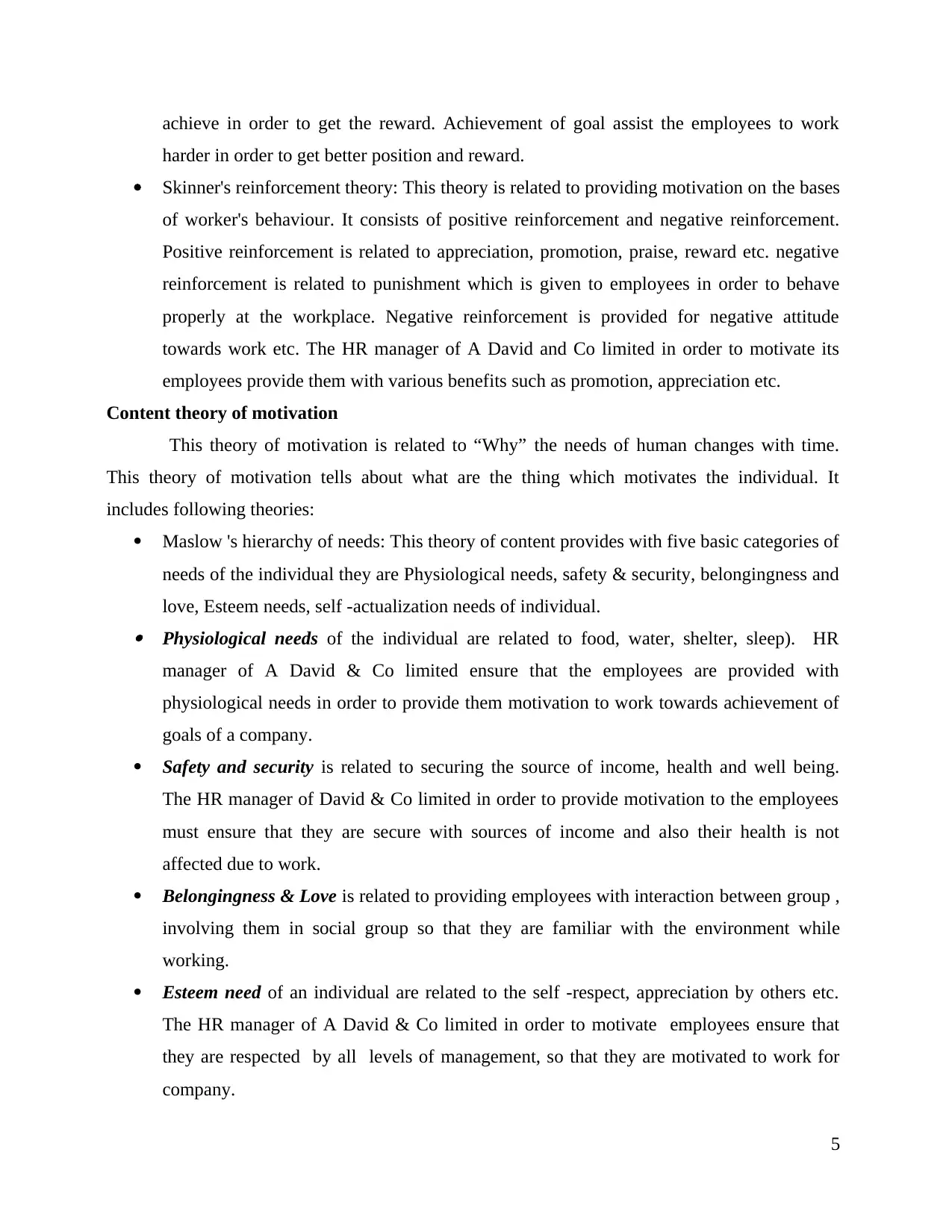
achieve in order to get the reward. Achievement of goal assist the employees to work
harder in order to get better position and reward.
Skinner's reinforcement theory: This theory is related to providing motivation on the bases
of worker's behaviour. It consists of positive reinforcement and negative reinforcement.
Positive reinforcement is related to appreciation, promotion, praise, reward etc. negative
reinforcement is related to punishment which is given to employees in order to behave
properly at the workplace. Negative reinforcement is provided for negative attitude
towards work etc. The HR manager of A David and Co limited in order to motivate its
employees provide them with various benefits such as promotion, appreciation etc.
Content theory of motivation
This theory of motivation is related to “Why” the needs of human changes with time.
This theory of motivation tells about what are the thing which motivates the individual. It
includes following theories:
Maslow 's hierarchy of needs: This theory of content provides with five basic categories of
needs of the individual they are Physiological needs, safety & security, belongingness and
love, Esteem needs, self -actualization needs of individual. Physiological needs of the individual are related to food, water, shelter, sleep). HR
manager of A David & Co limited ensure that the employees are provided with
physiological needs in order to provide them motivation to work towards achievement of
goals of a company.
Safety and security is related to securing the source of income, health and well being.
The HR manager of David & Co limited in order to provide motivation to the employees
must ensure that they are secure with sources of income and also their health is not
affected due to work.
Belongingness & Love is related to providing employees with interaction between group ,
involving them in social group so that they are familiar with the environment while
working.
Esteem need of an individual are related to the self -respect, appreciation by others etc.
The HR manager of A David & Co limited in order to motivate employees ensure that
they are respected by all levels of management, so that they are motivated to work for
company.
5
harder in order to get better position and reward.
Skinner's reinforcement theory: This theory is related to providing motivation on the bases
of worker's behaviour. It consists of positive reinforcement and negative reinforcement.
Positive reinforcement is related to appreciation, promotion, praise, reward etc. negative
reinforcement is related to punishment which is given to employees in order to behave
properly at the workplace. Negative reinforcement is provided for negative attitude
towards work etc. The HR manager of A David and Co limited in order to motivate its
employees provide them with various benefits such as promotion, appreciation etc.
Content theory of motivation
This theory of motivation is related to “Why” the needs of human changes with time.
This theory of motivation tells about what are the thing which motivates the individual. It
includes following theories:
Maslow 's hierarchy of needs: This theory of content provides with five basic categories of
needs of the individual they are Physiological needs, safety & security, belongingness and
love, Esteem needs, self -actualization needs of individual. Physiological needs of the individual are related to food, water, shelter, sleep). HR
manager of A David & Co limited ensure that the employees are provided with
physiological needs in order to provide them motivation to work towards achievement of
goals of a company.
Safety and security is related to securing the source of income, health and well being.
The HR manager of David & Co limited in order to provide motivation to the employees
must ensure that they are secure with sources of income and also their health is not
affected due to work.
Belongingness & Love is related to providing employees with interaction between group ,
involving them in social group so that they are familiar with the environment while
working.
Esteem need of an individual are related to the self -respect, appreciation by others etc.
The HR manager of A David & Co limited in order to motivate employees ensure that
they are respected by all levels of management, so that they are motivated to work for
company.
5
Paraphrase This Document
Need a fresh take? Get an instant paraphrase of this document with our AI Paraphraser
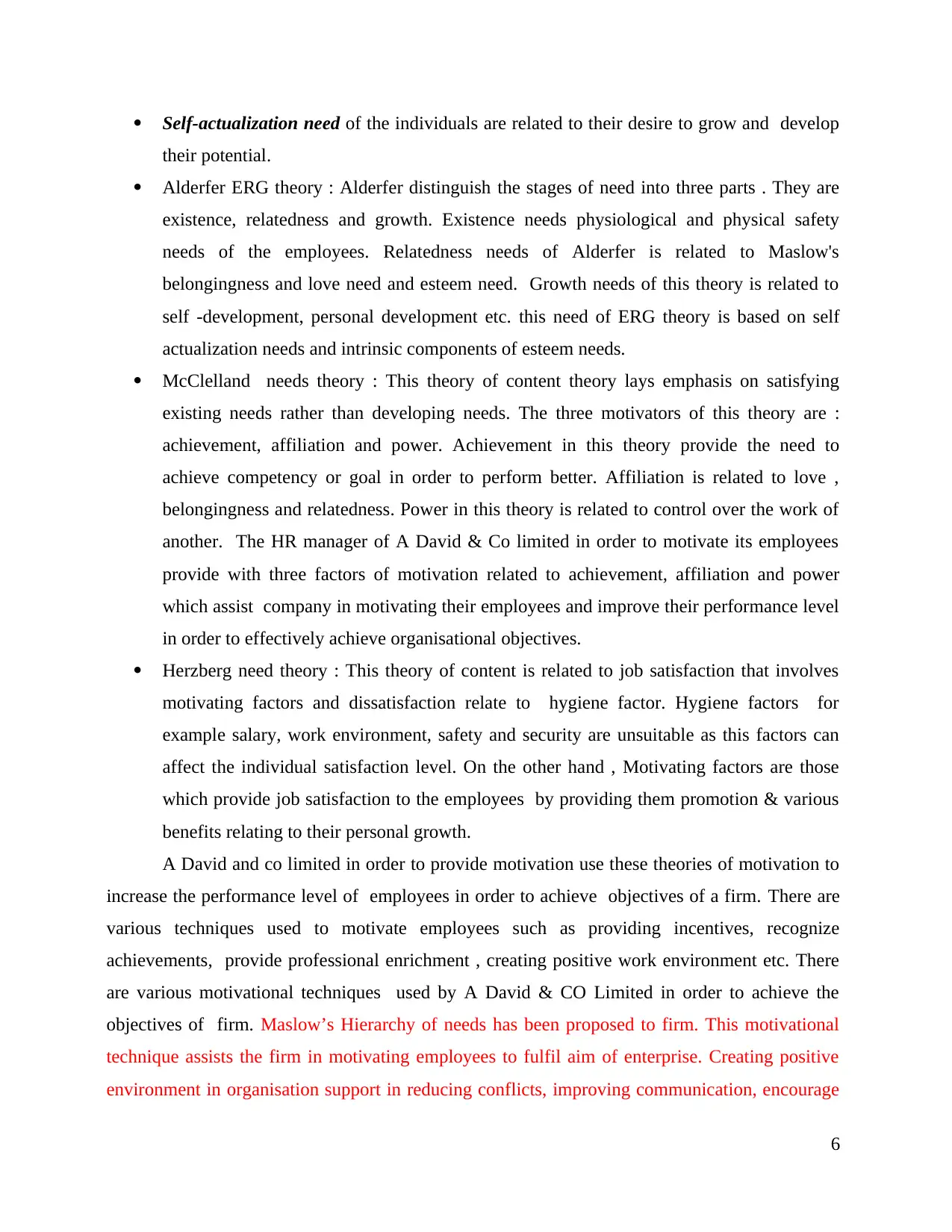
Self-actualization need of the individuals are related to their desire to grow and develop
their potential.
Alderfer ERG theory : Alderfer distinguish the stages of need into three parts . They are
existence, relatedness and growth. Existence needs physiological and physical safety
needs of the employees. Relatedness needs of Alderfer is related to Maslow's
belongingness and love need and esteem need. Growth needs of this theory is related to
self -development, personal development etc. this need of ERG theory is based on self
actualization needs and intrinsic components of esteem needs.
McClelland needs theory : This theory of content theory lays emphasis on satisfying
existing needs rather than developing needs. The three motivators of this theory are :
achievement, affiliation and power. Achievement in this theory provide the need to
achieve competency or goal in order to perform better. Affiliation is related to love ,
belongingness and relatedness. Power in this theory is related to control over the work of
another. The HR manager of A David & Co limited in order to motivate its employees
provide with three factors of motivation related to achievement, affiliation and power
which assist company in motivating their employees and improve their performance level
in order to effectively achieve organisational objectives.
Herzberg need theory : This theory of content is related to job satisfaction that involves
motivating factors and dissatisfaction relate to hygiene factor. Hygiene factors for
example salary, work environment, safety and security are unsuitable as this factors can
affect the individual satisfaction level. On the other hand , Motivating factors are those
which provide job satisfaction to the employees by providing them promotion & various
benefits relating to their personal growth.
A David and co limited in order to provide motivation use these theories of motivation to
increase the performance level of employees in order to achieve objectives of a firm. There are
various techniques used to motivate employees such as providing incentives, recognize
achievements, provide professional enrichment , creating positive work environment etc. There
are various motivational techniques used by A David & CO Limited in order to achieve the
objectives of firm. Maslow’s Hierarchy of needs has been proposed to firm. This motivational
technique assists the firm in motivating employees to fulfil aim of enterprise. Creating positive
environment in organisation support in reducing conflicts, improving communication, encourage
6
their potential.
Alderfer ERG theory : Alderfer distinguish the stages of need into three parts . They are
existence, relatedness and growth. Existence needs physiological and physical safety
needs of the employees. Relatedness needs of Alderfer is related to Maslow's
belongingness and love need and esteem need. Growth needs of this theory is related to
self -development, personal development etc. this need of ERG theory is based on self
actualization needs and intrinsic components of esteem needs.
McClelland needs theory : This theory of content theory lays emphasis on satisfying
existing needs rather than developing needs. The three motivators of this theory are :
achievement, affiliation and power. Achievement in this theory provide the need to
achieve competency or goal in order to perform better. Affiliation is related to love ,
belongingness and relatedness. Power in this theory is related to control over the work of
another. The HR manager of A David & Co limited in order to motivate its employees
provide with three factors of motivation related to achievement, affiliation and power
which assist company in motivating their employees and improve their performance level
in order to effectively achieve organisational objectives.
Herzberg need theory : This theory of content is related to job satisfaction that involves
motivating factors and dissatisfaction relate to hygiene factor. Hygiene factors for
example salary, work environment, safety and security are unsuitable as this factors can
affect the individual satisfaction level. On the other hand , Motivating factors are those
which provide job satisfaction to the employees by providing them promotion & various
benefits relating to their personal growth.
A David and co limited in order to provide motivation use these theories of motivation to
increase the performance level of employees in order to achieve objectives of a firm. There are
various techniques used to motivate employees such as providing incentives, recognize
achievements, provide professional enrichment , creating positive work environment etc. There
are various motivational techniques used by A David & CO Limited in order to achieve the
objectives of firm. Maslow’s Hierarchy of needs has been proposed to firm. This motivational
technique assists the firm in motivating employees to fulfil aim of enterprise. Creating positive
environment in organisation support in reducing conflicts, improving communication, encourage
6
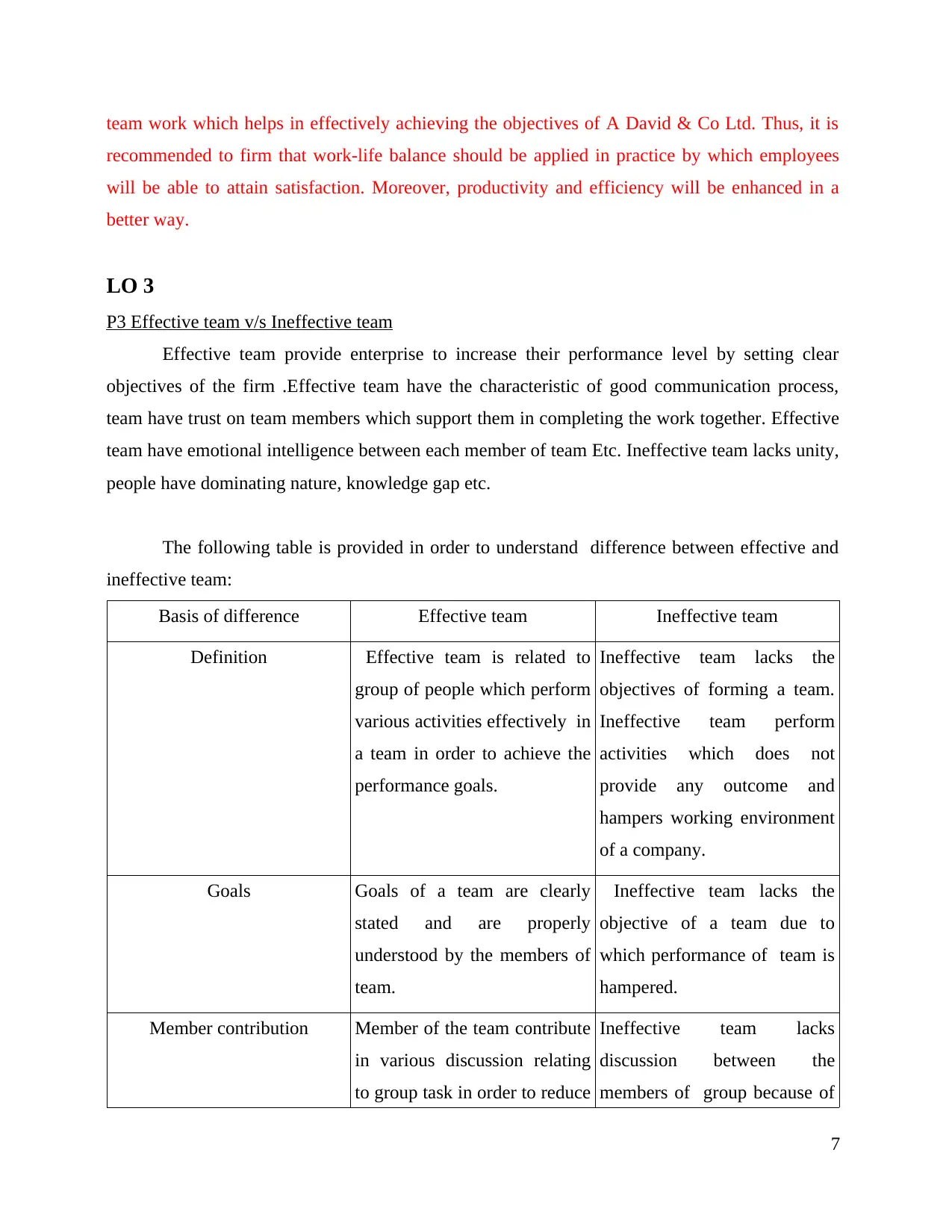
team work which helps in effectively achieving the objectives of A David & Co Ltd. Thus, it is
recommended to firm that work-life balance should be applied in practice by which employees
will be able to attain satisfaction. Moreover, productivity and efficiency will be enhanced in a
better way.
LO 3
P3 Effective team v/s Ineffective team
Effective team provide enterprise to increase their performance level by setting clear
objectives of the firm .Effective team have the characteristic of good communication process,
team have trust on team members which support them in completing the work together. Effective
team have emotional intelligence between each member of team Etc. Ineffective team lacks unity,
people have dominating nature, knowledge gap etc.
The following table is provided in order to understand difference between effective and
ineffective team:
Basis of difference Effective team Ineffective team
Definition Effective team is related to
group of people which perform
various activities effectively in
a team in order to achieve the
performance goals.
Ineffective team lacks the
objectives of forming a team.
Ineffective team perform
activities which does not
provide any outcome and
hampers working environment
of a company.
Goals Goals of a team are clearly
stated and are properly
understood by the members of
team.
Ineffective team lacks the
objective of a team due to
which performance of team is
hampered.
Member contribution Member of the team contribute
in various discussion relating
to group task in order to reduce
Ineffective team lacks
discussion between the
members of group because of
7
recommended to firm that work-life balance should be applied in practice by which employees
will be able to attain satisfaction. Moreover, productivity and efficiency will be enhanced in a
better way.
LO 3
P3 Effective team v/s Ineffective team
Effective team provide enterprise to increase their performance level by setting clear
objectives of the firm .Effective team have the characteristic of good communication process,
team have trust on team members which support them in completing the work together. Effective
team have emotional intelligence between each member of team Etc. Ineffective team lacks unity,
people have dominating nature, knowledge gap etc.
The following table is provided in order to understand difference between effective and
ineffective team:
Basis of difference Effective team Ineffective team
Definition Effective team is related to
group of people which perform
various activities effectively in
a team in order to achieve the
performance goals.
Ineffective team lacks the
objectives of forming a team.
Ineffective team perform
activities which does not
provide any outcome and
hampers working environment
of a company.
Goals Goals of a team are clearly
stated and are properly
understood by the members of
team.
Ineffective team lacks the
objective of a team due to
which performance of team is
hampered.
Member contribution Member of the team contribute
in various discussion relating
to group task in order to reduce
Ineffective team lacks
discussion between the
members of group because of
7
⊘ This is a preview!⊘
Do you want full access?
Subscribe today to unlock all pages.

Trusted by 1+ million students worldwide
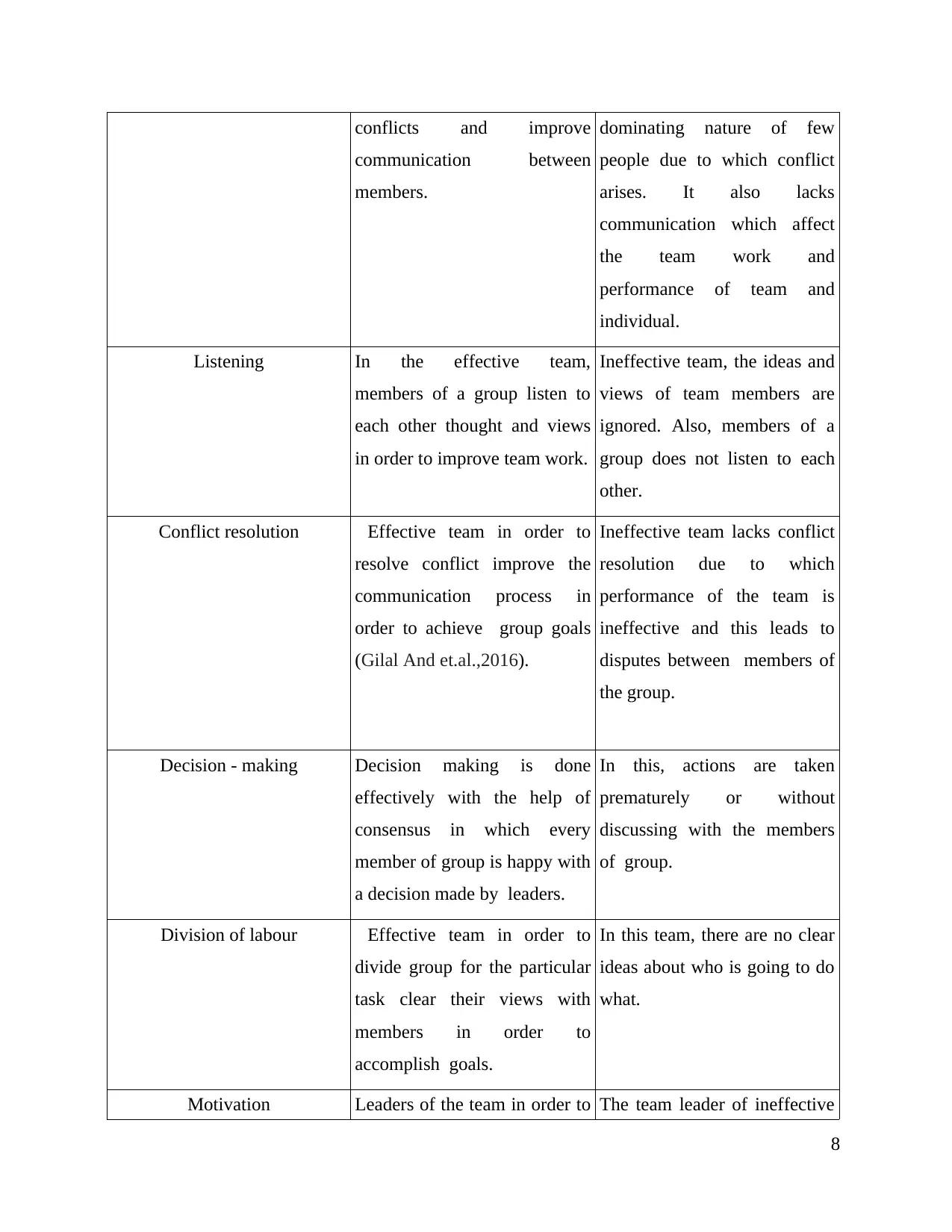
conflicts and improve
communication between
members.
dominating nature of few
people due to which conflict
arises. It also lacks
communication which affect
the team work and
performance of team and
individual.
Listening In the effective team,
members of a group listen to
each other thought and views
in order to improve team work.
Ineffective team, the ideas and
views of team members are
ignored. Also, members of a
group does not listen to each
other.
Conflict resolution Effective team in order to
resolve conflict improve the
communication process in
order to achieve group goals
(Gilal And et.al.,2016).
Ineffective team lacks conflict
resolution due to which
performance of the team is
ineffective and this leads to
disputes between members of
the group.
Decision - making Decision making is done
effectively with the help of
consensus in which every
member of group is happy with
a decision made by leaders.
In this, actions are taken
prematurely or without
discussing with the members
of group.
Division of labour Effective team in order to
divide group for the particular
task clear their views with
members in order to
accomplish goals.
In this team, there are no clear
ideas about who is going to do
what.
Motivation Leaders of the team in order to The team leader of ineffective
8
communication between
members.
dominating nature of few
people due to which conflict
arises. It also lacks
communication which affect
the team work and
performance of team and
individual.
Listening In the effective team,
members of a group listen to
each other thought and views
in order to improve team work.
Ineffective team, the ideas and
views of team members are
ignored. Also, members of a
group does not listen to each
other.
Conflict resolution Effective team in order to
resolve conflict improve the
communication process in
order to achieve group goals
(Gilal And et.al.,2016).
Ineffective team lacks conflict
resolution due to which
performance of the team is
ineffective and this leads to
disputes between members of
the group.
Decision - making Decision making is done
effectively with the help of
consensus in which every
member of group is happy with
a decision made by leaders.
In this, actions are taken
prematurely or without
discussing with the members
of group.
Division of labour Effective team in order to
divide group for the particular
task clear their views with
members in order to
accomplish goals.
In this team, there are no clear
ideas about who is going to do
what.
Motivation Leaders of the team in order to The team leader of ineffective
8
Paraphrase This Document
Need a fresh take? Get an instant paraphrase of this document with our AI Paraphraser
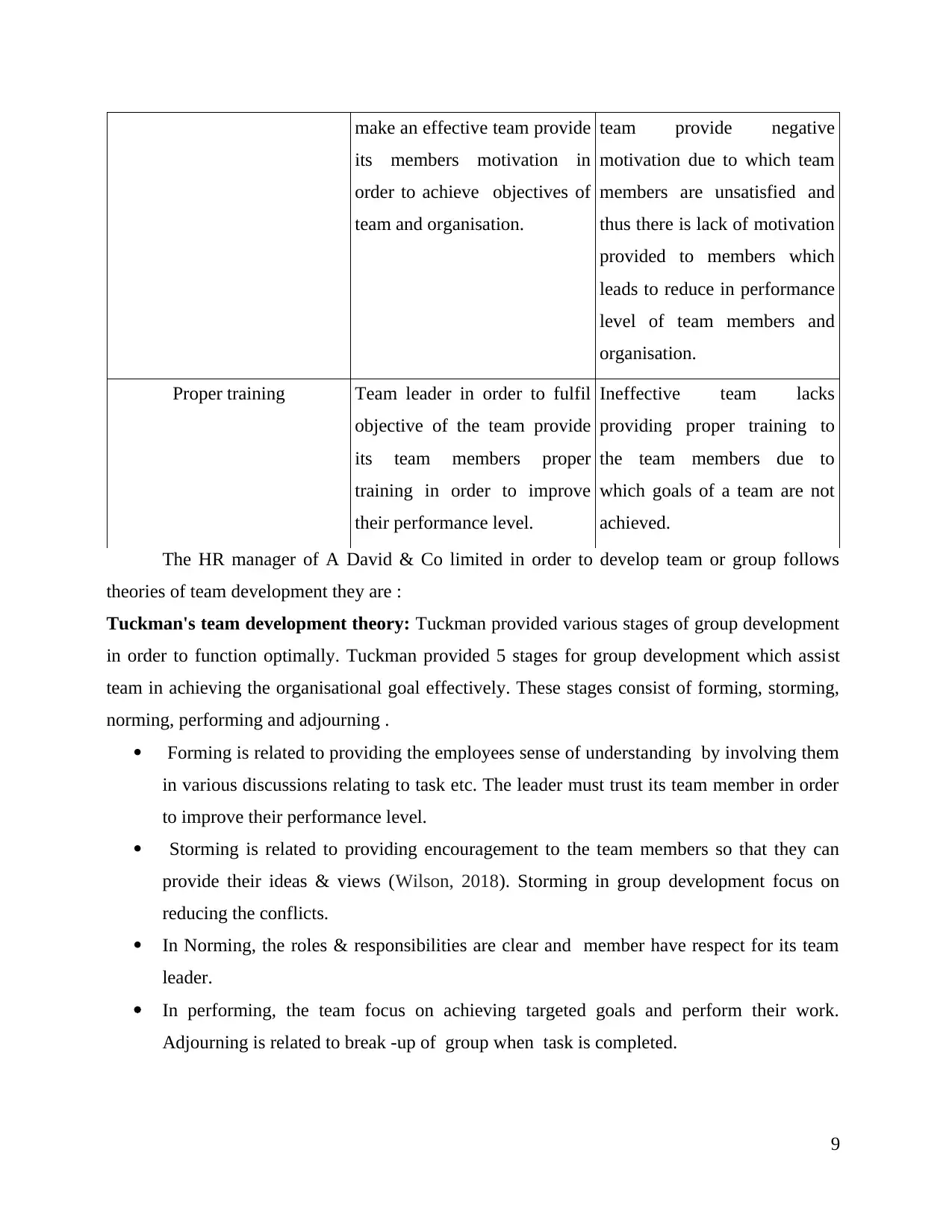
make an effective team provide
its members motivation in
order to achieve objectives of
team and organisation.
team provide negative
motivation due to which team
members are unsatisfied and
thus there is lack of motivation
provided to members which
leads to reduce in performance
level of team members and
organisation.
Proper training Team leader in order to fulfil
objective of the team provide
its team members proper
training in order to improve
their performance level.
Ineffective team lacks
providing proper training to
the team members due to
which goals of a team are not
achieved.
The HR manager of A David & Co limited in order to develop team or group follows
theories of team development they are :
Tuckman's team development theory: Tuckman provided various stages of group development
in order to function optimally. Tuckman provided 5 stages for group development which assist
team in achieving the organisational goal effectively. These stages consist of forming, storming,
norming, performing and adjourning .
Forming is related to providing the employees sense of understanding by involving them
in various discussions relating to task etc. The leader must trust its team member in order
to improve their performance level.
Storming is related to providing encouragement to the team members so that they can
provide their ideas & views (Wilson, 2018). Storming in group development focus on
reducing the conflicts.
In Norming, the roles & responsibilities are clear and member have respect for its team
leader.
In performing, the team focus on achieving targeted goals and perform their work.
Adjourning is related to break -up of group when task is completed.
9
its members motivation in
order to achieve objectives of
team and organisation.
team provide negative
motivation due to which team
members are unsatisfied and
thus there is lack of motivation
provided to members which
leads to reduce in performance
level of team members and
organisation.
Proper training Team leader in order to fulfil
objective of the team provide
its team members proper
training in order to improve
their performance level.
Ineffective team lacks
providing proper training to
the team members due to
which goals of a team are not
achieved.
The HR manager of A David & Co limited in order to develop team or group follows
theories of team development they are :
Tuckman's team development theory: Tuckman provided various stages of group development
in order to function optimally. Tuckman provided 5 stages for group development which assist
team in achieving the organisational goal effectively. These stages consist of forming, storming,
norming, performing and adjourning .
Forming is related to providing the employees sense of understanding by involving them
in various discussions relating to task etc. The leader must trust its team member in order
to improve their performance level.
Storming is related to providing encouragement to the team members so that they can
provide their ideas & views (Wilson, 2018). Storming in group development focus on
reducing the conflicts.
In Norming, the roles & responsibilities are clear and member have respect for its team
leader.
In performing, the team focus on achieving targeted goals and perform their work.
Adjourning is related to break -up of group when task is completed.
9
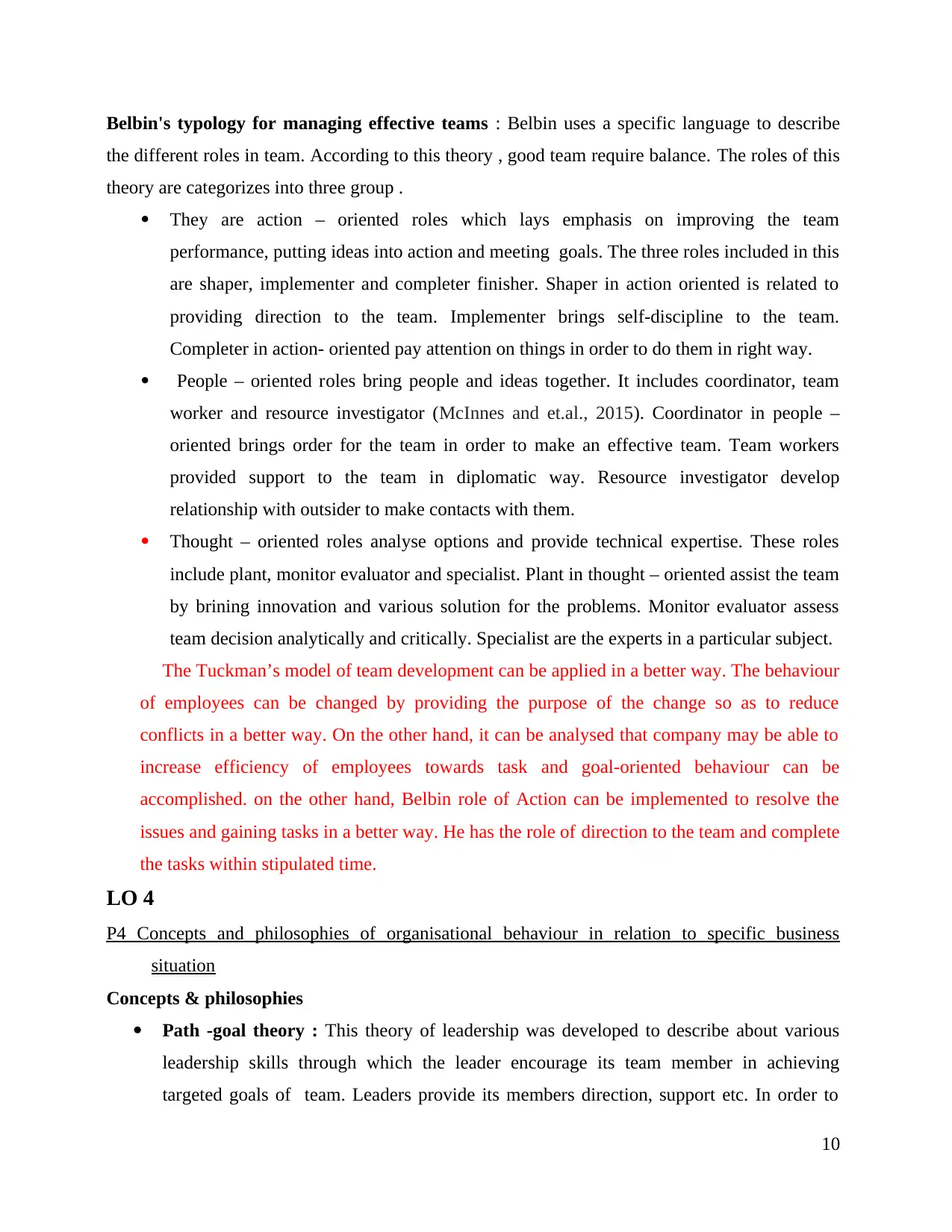
Belbin's typology for managing effective teams : Belbin uses a specific language to describe
the different roles in team. According to this theory , good team require balance. The roles of this
theory are categorizes into three group .
They are action – oriented roles which lays emphasis on improving the team
performance, putting ideas into action and meeting goals. The three roles included in this
are shaper, implementer and completer finisher. Shaper in action oriented is related to
providing direction to the team. Implementer brings self-discipline to the team.
Completer in action- oriented pay attention on things in order to do them in right way.
People – oriented roles bring people and ideas together. It includes coordinator, team
worker and resource investigator (McInnes and et.al., 2015). Coordinator in people –
oriented brings order for the team in order to make an effective team. Team workers
provided support to the team in diplomatic way. Resource investigator develop
relationship with outsider to make contacts with them.
Thought – oriented roles analyse options and provide technical expertise. These roles
include plant, monitor evaluator and specialist. Plant in thought – oriented assist the team
by brining innovation and various solution for the problems. Monitor evaluator assess
team decision analytically and critically. Specialist are the experts in a particular subject.
The Tuckman’s model of team development can be applied in a better way. The behaviour
of employees can be changed by providing the purpose of the change so as to reduce
conflicts in a better way. On the other hand, it can be analysed that company may be able to
increase efficiency of employees towards task and goal-oriented behaviour can be
accomplished. on the other hand, Belbin role of Action can be implemented to resolve the
issues and gaining tasks in a better way. He has the role of direction to the team and complete
the tasks within stipulated time.
LO 4
P4 Concepts and philosophies of organisational behaviour in relation to specific business
situation
Concepts & philosophies
Path -goal theory : This theory of leadership was developed to describe about various
leadership skills through which the leader encourage its team member in achieving
targeted goals of team. Leaders provide its members direction, support etc. In order to
10
the different roles in team. According to this theory , good team require balance. The roles of this
theory are categorizes into three group .
They are action – oriented roles which lays emphasis on improving the team
performance, putting ideas into action and meeting goals. The three roles included in this
are shaper, implementer and completer finisher. Shaper in action oriented is related to
providing direction to the team. Implementer brings self-discipline to the team.
Completer in action- oriented pay attention on things in order to do them in right way.
People – oriented roles bring people and ideas together. It includes coordinator, team
worker and resource investigator (McInnes and et.al., 2015). Coordinator in people –
oriented brings order for the team in order to make an effective team. Team workers
provided support to the team in diplomatic way. Resource investigator develop
relationship with outsider to make contacts with them.
Thought – oriented roles analyse options and provide technical expertise. These roles
include plant, monitor evaluator and specialist. Plant in thought – oriented assist the team
by brining innovation and various solution for the problems. Monitor evaluator assess
team decision analytically and critically. Specialist are the experts in a particular subject.
The Tuckman’s model of team development can be applied in a better way. The behaviour
of employees can be changed by providing the purpose of the change so as to reduce
conflicts in a better way. On the other hand, it can be analysed that company may be able to
increase efficiency of employees towards task and goal-oriented behaviour can be
accomplished. on the other hand, Belbin role of Action can be implemented to resolve the
issues and gaining tasks in a better way. He has the role of direction to the team and complete
the tasks within stipulated time.
LO 4
P4 Concepts and philosophies of organisational behaviour in relation to specific business
situation
Concepts & philosophies
Path -goal theory : This theory of leadership was developed to describe about various
leadership skills through which the leader encourage its team member in achieving
targeted goals of team. Leaders provide its members direction, support etc. In order to
10
⊘ This is a preview!⊘
Do you want full access?
Subscribe today to unlock all pages.

Trusted by 1+ million students worldwide
1 out of 16
Related Documents
Your All-in-One AI-Powered Toolkit for Academic Success.
+13062052269
info@desklib.com
Available 24*7 on WhatsApp / Email
![[object Object]](/_next/static/media/star-bottom.7253800d.svg)
Unlock your academic potential
Copyright © 2020–2026 A2Z Services. All Rights Reserved. Developed and managed by ZUCOL.





